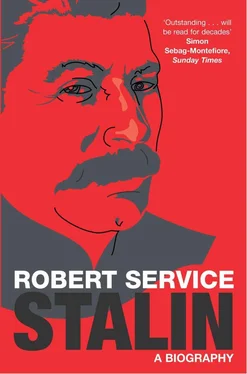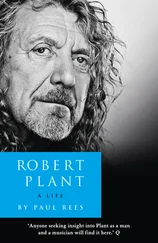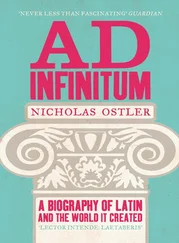The stories told by Stalin to friends and relatives from the 1930s onwards are one of the main sources for what happened in his childhood. Yet it hardly needs to be emphasised that he was an inveterate liar — and even when not lying directly, he often exaggerated or distorted the truth. His usual tale of childhood was filled with outbursts of drunken violence by Besarion, but all his stories have to be treated with caution. When in 1931 Stalin was asked about his childhood by the writer Emile Ludwig, he strenuously rebuffed suggestions of mistreatment: ‘No,’ he asserted, ‘my parents were uneducated people but they didn’t handle me at all badly.’ 16This was out of line with his other recollections. He told his daughter Svetlana about how he stood up to his father and threw a knife at him when Keke was taking yet another beating. The knife missed its aim. Besarion hurled himself at young Joseph but was too slow to catch him. Joseph ran off and was hidden by neighbours until his father’s rage had spent itself. 17
The memoirs of his friends without exception affirm that Beso was a brute to his son. Keke too was reportedly not averse to giving him a thrashing. 18If this was true, the Dzhughashvili household was filled with violence, and little Joseph must have grown up assuming that this was in the natural order of things. Perhaps he contradicted this when being interviewed by Ludwig because he sensed that he was being probed for a psychological origin of his political severity. No psychoanalytical sophistication is required. Like many who have been bullied in childhood, Joseph grew up looking for others whom he could bully. Not everyone beaten by parents acquires a murderous personality. Yet some do, and it would seem that more do than is true for general society. What made things worse for Joseph’s subsequent development was that his father’s violence was neither merited nor predictable. It is scarcely astounding that he grew up with a strong tendency towards resentment and retaliation.
Keke Dzhughashvili was strict with him but also smothered him with attention and affection. In an unguarded moment with Soviet army commander Georgi Zhukov in the Second World War he said that she never let him out of her sight till he was six years old. He also said that he had been a sickly infant. 19This was putting it mildly. Around the age of six he fell victim to smallpox. His mother was frantic. Smallpox was often a fatal disease and for a time it looked as if she would lose him. Poor families like the Dzhughashvilis could not afford doctors’ visits and their medicines. Most people in Gori in any case retained faith in the rural ways of dealing with disease. A female healer — Stalin was later to call her a znakharka when speaking in Russian — was summoned to treat Joseph. Against the odds, he recovered. The after-effects were limited to facial pockmarks. Joseph Dzhughashvili had had a narrow escape. This was to be a pattern in years to come. Although Joseph was prone to illnesses, his physical resilience saw him through. 20
It would not be a surprise if the crisis strengthened maternal protectiveness. Keke’s disappointment in her husband was sublimated into high expectations of her Joseph — and the fact that he was her only surviving child intensified her preoccupation with him. Keke was a typical Georgian woman of the period. There was no realistic opportunity for her to break out of the vicious circle of poverty. The best she could do was to earn a little from cleaning and sewing for better-off families. This would alleviate the poverty. But basic improvement would have to wait until the next generation. Joseph was her sole hope.
Yet she could not keep him in the house for ever. Joseph had a mind of his own and wanted to be accepted by the other boys. Once Joseph started to go out on to the streets, however, he had to cope with another challenge. The boys in Gori formed gangs in each little district. There was a lot of rough-and-tumble. There was much mixing of the various national groups. Respect accrued to those lads who could look after themselves in wrestling contests organised out of sight of the adults. Fist fights were common. Joseph, who had been tied to his mother’s apron strings, took time to assert himself. His contemporary Kote Charkviani wrote: ‘Before he was enrolled at school, not a day passed without someone thumping him, and he would either go back home in tears or else he himself would rough someone up.’ 21But as Charkviani noted, Joseph was determined to prevail. No matter how many times he was knocked down, he got back up and fought on. He broke the rules if it helped him to win. Joseph was sly. He was also ambitious: he wanted to lead the gang and was resentful when he did not get his way.
But his mother continued to adore him and point him in the direction of an ecclesiastical career; and he was obliged to conform whenever she was near him. Regular church attendance was obligatory. Soon he caught the attention of influential figures in the town. Joseph was God-fearing and bright. He was exactly the sort of boy whom the priests wanted to admit to the Gori Spiritual School, especially in the light of his mother’s wish for him to enter the clergy. Joseph was given a place in summer 1888 in his tenth year. His studies would start in September.
Poor though the Dzhughashvili family was, Joseph was being given a chance only a few dozen boys got in the town: he was going to be educated. He would receive a small stipend of three rubles a month. 22A portrait of him as he commenced his studies comes from a memoir by Vano Ketskhoveli: 23
I… saw that among the pupils was standing a boy I didn’t know, dressed in a long akhalukhi [a plain, cloth body-garment] which went down to his knees, in new boots with high tops. He had a thick leather belt tightly drawn around his waist. On his head was a black cloth peak-cap with a varnished peak which shone in the sun.
No one else wore either an akhalukhi or such boots, and the other pupils pressed around him out of curiosity. Obviously his mother was very eager to dress her son as well as possible; she had coddled him since birth. She herself had never been to school, and probably she did not understand that by dressing him up differently, she did him no favours with his fellow pupils.
Gradually he began to stand up to her. When out of her sight, he pulled off his white collar and mixed with the other boys on the streets. 24He adopted the same routines at school. All first-hand accounts recorded his pugnacity towards rivals. But he was also devout, hard-working and determined to succeed, and the path on which he was stepping offered the chance for him to move out of the poverty he endured at home.
His intelligence and diligence had been recognised. His peculiarities were noted by acquaintances: he was volatile, sly and resentful. But nobody yet felt that these features existed to an abnormal degree. He had had a rougher upbringing than most other boys in the town and much was forgiven him. It was only in retrospect that the cocktail of permanent harm to his personality became detectable. He was mistreated by his father, and detested him. At the same time his mother handled him as a very special person; much was expected of him. Being an only child, he was spoiled. This can only have increased his resentment at the way his father behaved towards him. The fuss made of him by Keke protected him for a while against the rough games of the local boys. But the will to prove himself had not been cosseted out of him, and his father’s recurrent violence gave him a competing model of the kind of man he wanted to be. Although he desired to become a priest, he also wished to prove his toughness. He had known no fairness from his father; he would show none to those contemporaries who got in his way. He was not the strongest fighter on his streets but compensated by using methods that others avoided. His constant wish was to get on top and stay there: this was one of the few attitudes shared by his father and mother, albeit in their different ways.
Читать дальше












